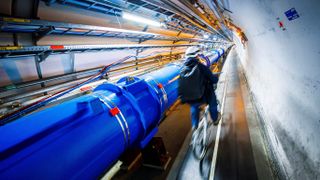CERN halts future collaboration with Russia
CERN’s announcement comes on the 13th day of the Russian invasion.

The European Council for Nuclear Research (CERN) has announced that it will suspend Russia's "Observer" status at its facilities and halt new partnerships with Russian scientific institutions following Russia's military invasion of Ukraine.
The vote, which falls short of an initial suggestion to ban Russian scientists outright from CERN facilities, was spearheaded by Ukrainian scientists at the Geneva organization. CERN also announced it will promote initiatives to support Ukrainian scientists and Ukrainian projects in the field of high energy physics.
CERN operates the Large Hadron Collider — the world's largest atom smasher famous for discovering the Higgs Boson in 2012 — as part of a collaboration between 23 member states and seven associated member states; Ukraine is among the latter, and pays dues to the organization. Russia (much like the U.S.) has observer membership, meaning that while it doesn't pay dues, it has more than 1,000 scientists who work at CERN — approximately 8% of the collaboration's 12,000 researchers, according to Science.
Related: Beyond Higgs: 5 Elusive Particles That May Lurk in the Universe
"The 23 Member States of CERN condemn, in the strongest terms, the military invasion of Ukraine by the Russian Federation, and deplore the resulting loss of life and humanitarian impact," CERN's council announced in a statement released after the meeting. "Deeply touched by the widespread and tragic consequences of the aggression, the CERN Management and personnel, as well as the scientific community in CERN's Member States, are working to contribute to the humanitarian effort in Ukraine and to help the Ukrainian community at CERN."
The announcement is a significant step for CERN. Founded in 1954, the collaboration enabled European, American and Russian scientists to work together even during the frostiest years of the Cold War: including the 1962 Cuban Missile Crisis the Soviet Union's 1968 crackdown of the Prague Spring; and its 1979 invasion of Afghanistan. Throughout this time CERN maintained its political neutrality. Today's announcement has brought that to an end.
Science has reported that some of the Russian collaborators at CERN are among those speaking out against the Russian military's occupation of Ukraine, meaning that if they were expelled from CERN, they'd likely have to seek refuge at the organization anyway.
Sign up for the Live Science daily newsletter now
Get the world’s most fascinating discoveries delivered straight to your inbox.
"CERN as a leading scientific laboratory should terminate immediately any cooperation with Russian institutions, because otherwise every crime and every injustice made by their government and their armed forces is seen as legitimate," a Ukrainian physicist in Kyiv working on an experiment at CERN, told Science. "We call on democratic society, on scientific society, to stand with us against this tyrant [Russian President Vladimir Putin]."
Russia's invasion of Ukraine, which began on Feb. 24., has killed at least 406 civilians and injured at least 801, the United Nations said on Monday (March 7.). An official ceasefire agreement between Ukraine and Russia was broken today (March 8.) when Russia shelled an evacuation route for civilians trapped in the besieged city of Mariupol, according to a Ukrainian foreign ministry spokesperson.
"The situation will continue to be monitored carefully and the Council is ready to take any further measures, as appropriate, at its future meetings," CERN representatives said in the statement. "The CERN Council also expresses its support to the many members of CERN's Russian scientific community who reject this invasion."
Originally published on Live Science.

Ben Turner is a U.K. based staff writer at Live Science. He covers physics and astronomy, among other topics like tech and climate change. He graduated from University College London with a degree in particle physics before training as a journalist. When he's not writing, Ben enjoys reading literature, playing the guitar and embarrassing himself with chess.
Most Popular


